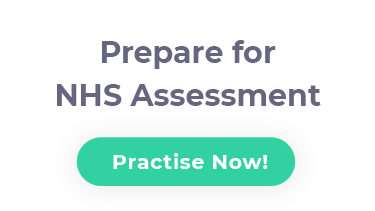NHS Assessment Centre, Aptitude Tests & Interview Process Online Preparation – 2025

What Is NHS?
NHS, or the National Health Service, is the government sponsored healthcare system in the United Kingdom. While they operate mainly in medicine and healthcare, they have positions available in areas such as:
- Administration
- Biomedical Science
- Estates & Ancillary
- Pharmaceuticals
NHS employs over a million people in the UK alone. They’re employees enjoy market competitive benefits like:
- Occupational Health and Counseling Services
- NHS Pension Scheme
- Study Leave for Sponsored Courses
- 27 Vacation Days Per Year
If you are a job seeker interested in NHS, check out the hints and tips below to better prepare yourself for their hiring process.
What Is NHS’s Hiring Process?
NHS is diligent and tedious in their hiring process due to the nature of their work in the medical industry. You can expect to see about three recruitment rounds that aim to assess the aptitude and behavior of candidates. The interview process will vary slightly depending on the position and location you have applied for.
Initial Screening
NHS utilizes the application forms as their initial screening. They are very particular about the contents of these forms and want to learn as much about you as they can. NHS rates applications by how closely an applicant’s experience and qualifications meet their selection criteria, so stay on topic.
NHS Interview Process
If you are successful in the initial screening portion of NHS’s hiring process, the interviews will commence. NHS conducts various competency-based interviews and uses a fairly standard outline for evaluating and recruiting prospects. The process will look like this:
- Aptitude Tests
- Panel Interview
- Final Interview
Additional steps may be taken for certain positions, but NHS typically vets their candidates using the aforementioned interview process.
What Are NHS’s Online Assessments?
The purpose of online assessments is to provide NHS with an objective measure of your skills and style. NHS administers anywhere from one to three assessments per candidate depending on the position they have applied for. The most common tests are:
- Verbal Reasoning Test
NHS’s verbal reasoning test evaluates the candidate’s ability to discern between facts and inferences. A hypothetical situation will be provided, and the candidate will be asked to assess the statements that follow as true, false or cannot say. The assessment is timed and usually takes anywhere from twenty to forty minutes.
- Numerical Reasoning Test
NHS’s numerical reasoning, or numeracy, test supplies common equations and problems one might find in a medical setting; for example, drug dose calculations. The problems will be presented as graphs or hypothetical situations and the candidate will be given a handful of answers to choose from. You will have a limited amount of time to complete the assessment.
- Situational Judgement Test
NHS’s situational judgement test, or SJT, evaluates the candidate’s emotional intelligence. The candidate will receive hypothetical scenarios and chose how to appropriately respond to them, whether it be in the context of handling a patient or colleague. NHS looks for candidates who exhibit their values:
- Compassion
- Openness
- Problem Solving
- Strive for Excellence
- Putting Patients First
- Using your Initiative
- Being Innovative
- Ensuring Patient Safety
Familiarize yourself with their values and what they mean to you and what they mean to NHS. Then, take practice tests and find ways you can apply their values to your answers. While taking NHS’s SJT, keep an eye out for questions that hint at these traits and qualities.
- Watson Glaser Test
NHS’s Watson Glaser test is divided into five parts: deduction, recognizing assumptions, interpretation, inference, and evaluation of arguments. The Watson Glaser test serves to analyze the critical thinking skills of the candidate and is commonly used for people applying to public health and specialist registrar positions.
Panel Interview
An applicant will be invited to interview in front of a panel if NHS finds the results of the online assessments to be satisfactory. The panel is typically three or more senior members of the field you are seeking employment in. NHS asks a variety of background, technical, and competency-based questions. The panel may also ask you to explain a time that you have demonstrated one of NHS’s values, so keep this in mind while preparing for your interview.
Final Interview
NHS’s final interview is mainly to conduct pre-employment checks and to learn more about a candidate. This interview is fairly informal, and you can expect to be asked about your background, your thoughts on the position and how you plan to succeed at NHS. The pre-employment checks include:
- Background Check
- Occupational Health Screening
- Verification of Employment History
- Criminal Records and Barring Checks
- Verification of Professional Registration and/or Qualifications
Students and Graduates
NHS offers countless programs that educate and employ students and graduates. The recruitment process differs slightly from the more experienced job seekers in the sense that students and graduates will be jumping through a few additional hoops. The interview process for students and grads will look like this:
- CV and Application Forms
- Online Assessments
- Assessment Centre
The CV and application forms serve as the initial screening at NHS for students and graduates. They receive a high volume of applications for most fields, so take your time on your application and make sure you enhance your strengths and capabilities.
NHS Online Assessments
NHS sends applicants a series of online assessments once their applications and CV’s have been reviewed and approved. The scores you receive on the online assessments determine whether you move forward to the assessment centre. Applicants typically take the following online assessments:
- Numerical Reasoning Test
NHS administers the numerical reasoning test to candidates to measure their capability to perform basic mathematical functions in a medical and business scenario. The format is multiple choice with a time constraint on each question.
- Verbal Reasoning Test
NHS’s verbal reasoning test provides the applicant with a paragraph of information followed by a handful of statements. Your job is to decide whether the provided statements are facts or inferences. The information you receive will be applicable to the medical and health industry, but if the particular topic discussed in the paragraph is somewhat foreign to you, don’t stress – the answers are all right in front of you.
- Situational Judgment Test
NHS’s situational judgement test assesses the candidate’s behavior as well as their communication skills. You will be given a hypothetical scenario followed by various ways in which to address and handle the issue at hand. NHS is looking for candidates who align with the company’s values. They litter the SJT with questions that prod at the traits and qualities they favor in their candidates.
- Personality Test
NHS’s personality test is a more relaxed version of the SJT and is in the format of a questionnaire. The purpose of the personality test is for NHS to get to know you better. They ask questions about your background, your work style and your behavioral preferences. While technically there are no right or wrong answers, use this as an opportunity to demonstrate NHS’s values for a leg up.
NHS Assessment Centre
The assessment centre portion of the recruitment process is the last chance for students and graduates to impress NHS. If you are attending an assessment day, you may do some or all of the following activities:
- Information Session
The information session is more of an informal meet and greet for the assessors and the candidates. Even though this part of assessment day is informal, treat it as if it were formal because NHS is evaluating you on everything.
- Literacy Test
NHS’s literacy test is fairly simple. You are given a hypothetical problem and are asked to write out a solution. Your solution should be written out as steps. Your handwriting and grammar are being assessed alongside the quality of your answers.
- Numeracy Test
The numeracy test is akin to the numerical reasoning test you receive in the online assessment portion of the recruitment process. The candidate is provided a hypothetical medical scenario and asked to find the numerical solution. NHS warns that the numeracy test has the highest rate of failure during assessment day, so practice as much as you can.
- Practical Test
NHS utilizes the practical tests to measure a candidate’s ability to perform the duties of the role they have applied for. The applicant is put in a simulation and asked to complete relevant tasks in a medical setting, such as walking through the steps of a procedure.
- Group Exercise
NHS’s group exercise can either be a clinical simulation, a topic-based discussion, or an informal activity, it all depends on the role you’ve applied for. Either way, the group exercise is a great opportunity to demonstrate to NHS your teamwork, communication and leadership skills.
- Interview
NHS has a final interview at the end of assessment day to reflect on the candidate’s performance and their suitability for the company. This is your chance to ask questions about the company, their atmosphere and whatever else may be on your mind.
How to Prepare for NHS’s Online Assessments?
NHS’s online assessments can be easily conquered with practice and adequate preparation. For the aptitude tests, take practice assessments online. Even the in-person aptitude tests at the assessment centre can be found online. If you’re familiar with the format and general idea of the content, you have a much better chance at succeeding during this round of recruitment. For the personality-based tests, study NHS’s values; they are practically giving you the answers. Try thinking of ways that you have demonstrated their values as guidance for the behavior and personality tests.
Conclusion
Overall, NHS is a great company with countless opportunities to learn and grow. Due to the importance of their work, NHS has a tedious interview process to ensure they are only hiring the best of the best. Claim your spot by practicing the online assessments, studying NHS’s values, and staying up to date on all the current affairs in your field of work. Best of luck!
Read more about:

